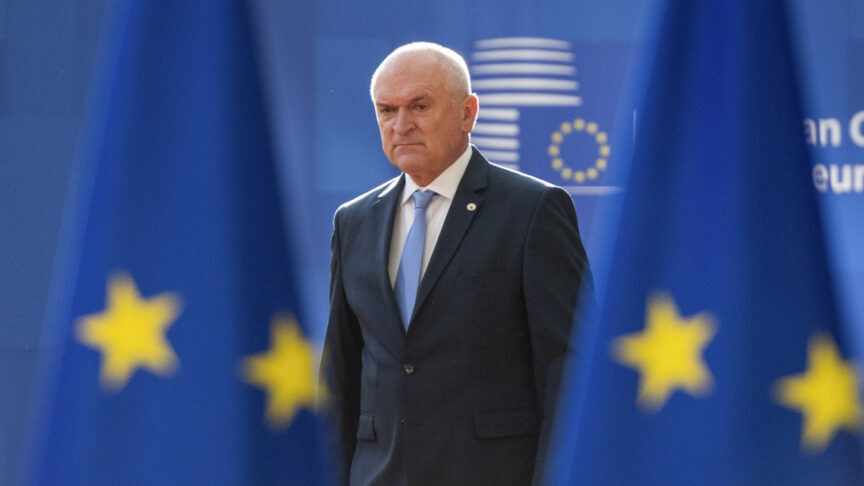Kosovo: statehood isn?t the problem
In its advisory opinion of 22 July 2010, the International Court of Justice said that Kosovo’s unilateral declaration of independence from Serbia in February 2008 “did not violate general international law”. But is statehood the real question hanging over Kosovo? Richard Gowan believes that corruption, rather than statehood, is the biggest issue facing Kosovo.
In its advisory opinion of 22 July 2010, the International Court of Justice said that Kosovo’s unilateral declaration of independence from Serbia in February 2008 “did not violate general international law”.
On 21 July, Richard Gowan wrote the following:
Is Kosovo a proper state? Don’t expect a clear answer from the International Court of Justice, which will give an opinion on the issue this Thursday. This non-binding statement was originally requested by the United Nations General Assembly in Autumn 2008 after Kosovo’s unilateral declaration of independence from Serbia.
As ECFR’s Anthony Dworkin notes, the ICJ may find “nothing inherently illegal about Kosovo’s declaration, but this does not in itself establish Kosovo as a legitimate state.”
And don’t ask the European Union either. It officially doesn’t know the answer. The EU has a 2,800-strong police and justice mission in Kosovo. But the Union is split between a majority of countries that recognise the state and a minority that does not (Cyprus, Greece, Romania, Spain and Slovakia). The EU police claims to be “status neutral”.
This is a clever but rather silly phrase, meant to imply that it’s possible for the EU to help police Kosovo without knowing if it’s a country or not. That’s rather like American teenagers claiming that they “just hang out” rather than date – comforting for those in the relationship, but really irritating for those (i.e. the Serbs) who can see what’s going on.
If you want the actual answer, it’s better to go to two places. One is downtown Pristina – an admittedly small area consisting of bars, pizza joints and one mall in Kosovo’s capital.
The other is the northern half of Mitrovica, a town on the border between the Albanian majority south of Kosovo and the mountainous, wild and pretty Serb-majority north.
Stop for an espresso in central Pristina, and you sense you are in a capital city – even if a quick glance around and a slurp of the coffee both confirm that it’s not exactly Rome. The town has a swing in its step, is free of the hordes of tubby UN police officers that swamped the place from 1999 on, and boasts standard-issue glass government buildings.
There are problems. Since 2008, the government of Hashim Thaci has disappointed and worried its friends in the EU and U.S. by indulging in corruption. The EU police were too soft on this at first, but have become much tougher in the last year.
Still, youngish post-war states are rarely pretty. And this is a state. There’s even a branch of popular Spanish clothing chain Mango (I think it’s genuine): that’s civilization.
Now go north to Mitrovica. In the southern, Albanian, half of the city you feel like you are in a poorer version of Pristina, with added NATO patrols. Cross the river Ibar into the north and you are in, well, Serbia. Kosovo’s government has no power here, and the EU has only limited leverage. It feels like it’s Serbia, with posters of Belgrade politicians.
But you aren’t really in Serbia. Since the fall of Milosevic, Serbs outside Kosovo have gradually accepted that they have to move away from national chauvinism towards the EU. The political big men in north Kosovo aren’t convinced: they may reject Pristina’s rule, but they oversee a zone in which Serb law is disrespected too. Belgrade is unhappy.
So Kosovo is a state (seen from Pristina) but not a state (seen from north Mitrovica). But it’s a potential breeding ground for corruption and crime however you look at it.
With luck, the ICJ’s forthcoming opinion will disappoint nationalists on both sides. There are tough political issues to be hammered out between Kosovo and Serbia. But the EU shouldn’t bother to invest in these talks until the two sides have worked out how to crack down on corruption across Kosovo. That, not statehood, is Kosovo’s problem now.
For more…
We have an audio podcast with Anthony Dworkin and Richard Gowan discussing the background to the decision and its implications. Click here to listen.
Jose Ignacio Torreblanca wrote an article on why we need to pay attention to ’embryo states’ – like Kosovo – as they try to become recognised states (published on 20 July 2010).
In May 2010 ECFR published Beyond-wait-and-see: the way forward for EU Balkan policy, a policy brief by Balkan experts Heather Grabbe, Gerald Knaus and Daniel Korski. The authors argued that the EU, preoccupied with the financial crisis, risks losing credibility and influence in the Western Balkans as the region threatens to slide back into instability.
And for journalists…click here for our press release on the ICJ’s Kosovo opinion, sent out on 21 July 2010.
The European Council on Foreign Relations does not take collective positions. ECFR publications only represent the views of their individual authors.


